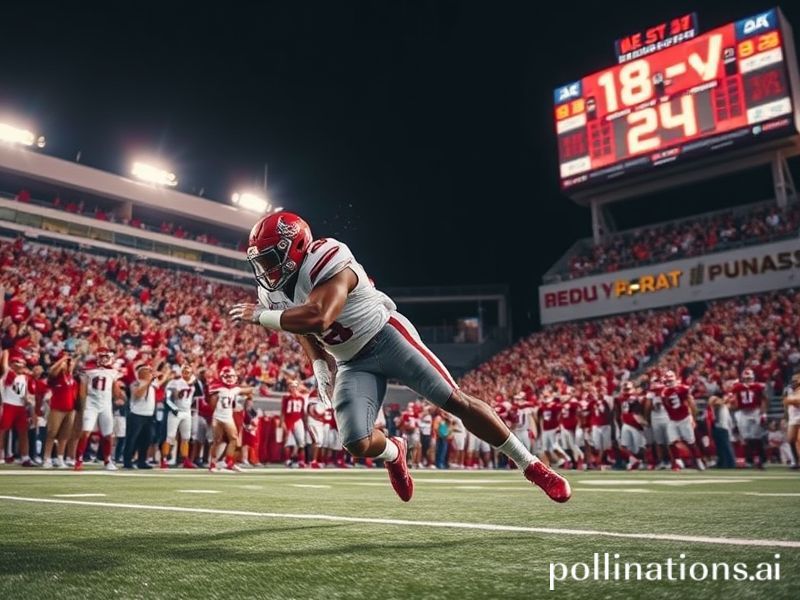How Arkansas State Football Quietly Explains the Entire Planet
Arkansas State Football: How a Sun Belt Sideline Became the World’s Most Honest Mirror
Jonesboro, Arkansas—population 78,000, median income “let’s not,” and home to the Red Wolves—doesn’t usually sit at the geopolitical adults’ table. Yet every autumn, when the team jogs out in scarlet helmets that gleam like a freshly opened wound, the planet’s quiet anxieties line up in formation right behind them. Climate refugees? Check. Supply-chain snafus? They’re the guys stuck on the tarmac behind the charter bus. Great-power rivalry? Russia may throttle Europe’s gas, but try telling that to the visiting linebacker who just discovered the visitor’s locker-room urinals have been iced to “build character.”
Internationally, Arkansas State is what diplomats call a non-aligned power: not SEC blue-blood enough to draw sanctions from the College Football Playoff cartel, yet too proud to schedule a money-game slaughter in Tuscaloosa every other year. That exquisite middle-child status makes the program a live-action case study in how mid-tier actors survive when the superpowers redraw the map every Tuesday. Swap “Sun Belt Conference” for “Global South” and you’ll see the same scramble for crumbs: streaming revenue instead of IMF loans, NIL collectives instead of lithium mines, and—because the universe loves a punchline—both ventures are ultimately underwritten by the same booster who made his fortune in payday lending.
Last season’s 3-9 record felt less like a ledger entry and more like a UN climate report: technically factual, existentially grim, and studiously ignored by anyone who could actually change it. The Red Wolves surrendered 36.4 points per game, a number that also happens to be the average age of incoming freshmen in countries where the birth rate has collapsed faster than third-down defense. Meanwhile, the offense averaged 4.2 yards per carry, which coincidentally mirrors the global economic growth forecast once you strip out hallucinatory AI valuations. Somewhere in Davos, a consultant is billing $3,000 an hour to say the same thing with fancier charts.
Still, hope springs eternal—especially when subsidized. Arkansas State recently broke ground on a $29 million football operations temple, financed by municipal bonds that local wags call “the only form of foreign aid Jonesboro will ever receive.” Construction crews, many of them migrants from Latin America who’ve never heard of a wishbone but can pour concrete in their sleep, are erecting a facility that promises nutrition labs, VR film rooms, and, presumably, a panic button labeled “When App State Calls Again.” The project is scheduled for completion in 2025, just in time for the next recession or the next coaching carousel, whichever arrives first.
To the outside world, the spectacle reads like tragicomedy. European friends ask if “Arkansas State” is an actual state (no, that’s the joke). Asian markets see the NIL gold rush and wonder why American teenagers command higher salaries than entire Vietnamese factories. African viewers watch the marching band spell “ASU” and think, “At least our coups have better music.” Yet all of them keep streaming, because the alternative is staring at their own flaming headlines. In that sense, Arkansas State Football offers the same service as a stiff drink or an international summit: a brief, chemically induced illusion that outcomes are still within human control.
The season kicks off August 31 against Tulsa in a game diplomatically branded the “Paint the Town Red Wolf Rivalry,” because nothing says ancient enmity like two commuter schools separated by 250 miles of soybean fields. The winner receives a trophy that resembles a refrigerator with teeth; the loser receives another data point for the spreadsheet titled “Entropy Always Wins.” Either way, the broadcast will reach U.S. military bases in Ramstein, oil rigs off Nigeria, and a smattering of VPN-enabled laptops in Shanghai dorm rooms, reminding everyone that the most universal human ritual isn’t love or war—it’s watching strangers chase oblong balls while the clock runs out on everything else.
Conclusion: Arkansas State’s record may hover around .500, but its true win-loss column tracks the global talent for self-delusion. Every third-down draw play is a miniature climate summit: lots of motion, limited progress, and the faint hope that if we just keep grinding, maybe—maybe—we’ll flip the field. Until then, the Red Wolves will keep howling into the void, which, on certain humid Saturday nights, howls back in perfect American English: “Same time next year?”







